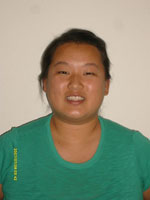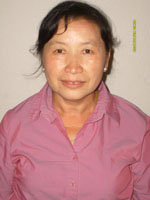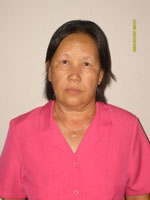Interview with Chia and Tria
 |  |  |
Sao | Chia | Tria |
Sao: How was land divided? Or did they just say, I take this area, and after I'm done, you can take it.
Tria: If two family finds the same land, then yes they will split the land. They get a stick and split the land and say you take this half and I'll take this half.
Sao: What is the expectation of a bride? Do you want her to be lazy, hardworking, or know how to cook.
Chia: we would like them to love one another and make healthy decisions for their future.
Tria: The bride should know how to cook, love the parent, clean the house, love their life, knows how to raise her kids properly and not being lazy.
Sao: When a guy gets married, is kidnapping or taking the bride by negotiation better? What do you think about kidnapping of a wife?
Chia: If the guy and a girl like each other and the guy takes her, then that is not considered kidnapping. It's only considered kidnapping if the guy just comes and takes her without any notice to her or her parents.
Sao: Do you think kidnap marriage is right?
Chia: Hmong people back then could use it.
Tria: Some will just go and kidnap her and that is not good.
Chia: Because once the boy takes the girl home, the parents of the bride cannot do anything about the kidnapping of their daughter. So, the parent of the daughter just hopes for the best and say that maybe they were meant to be. The girl will be mad because the girl is stolen from her family and the boy got what he wanted.
Sao: If the guy kidnaps his wife, and the wife does not like the guy, then can she come back to her family?
Tria: She can, but they tend to stay together.
Chia: The boys usually will go to his father and motherTria-inTria-law's house to negotiate with them. He will offer a lot of money to the girl's parents.
Sao: Is the money only for the parents or for the bride too?
Tria: The money is only offered to the parents for the bride.
Sao: If the guy did not love the woman that he kidnapped, is there a penalty for the guy?
Chia: Back then the guy had to love and be with her until the end. But the youth now, if they kidnap and do not like her, then they will be able to split up.
Sao: Did the Hmong people in Laos sell or give away their children for a debt that they owed?
Chia: Hmong people do not sell their kids. If a poor family's father died and they had no money to get an animal to sacrifice for the dead father, then they will have to trade one of the child to a close neighbor for an animal to sacrifice.
Sao: What is the relationship between the elders and the youth?
Chia: If you have trust in one another, then we can live happily under one roof.
Tria: Back then it was different than today. All we did was gardening, so there wasn't much communication. As of now, the youth does not listen to the elders anymore. The youth is no longer under the control of the elders.
Chia: The elders are in their own world back in Laos, and the youth now are in their world America. The elder says that I gave birth you here in the U.S and I will listen to what you say but you still have to respect me.
Tria: As long as we listen to one another then everything would be fine.
Sao: Do you think the Hmong youth today are as obedient that back then?
Chia: Back then, we only did gardening, so there wasn't much talk between each other. There was no school in urban areas so we were not as hard to deal with. If our elders said, go get some water, then the child would go get it.
Tria:They only took us gardening. If they told you to get fire woods, then you will go get fire woods.
Sao: How did the Hmong people express love?
Chia: Here in America, we have the saying, "I love you." But back in Laos, there was only the phrase, "I like you."
Sao: If you don't say I like you, or I love you, then how do you show love?
Chia: My parents showed love by having food provided for you when you come back home or just when you are home. They never said "I love you."
Tria: How do they love you? Well, when you are sick, they find food for you, have a shaman come over to heal you, buy clothes for you, find blankets and beds for you to sleep on, and they will always be with you.
And for the parents who doesn't love their children, the children wouldn't have clothes, food, and respect. They'll probably be treated like some orphans. When they eat, the parents would eat first, and as the children or child comes, they'll just say that they haven't eaten yet.
If you have parents, you will know that they loved you, and for those that don't have parents would not know.
Sao: Well my mom and dad has said, "It's not that we are yelling at you, but we are just warning you. It is because we love you, that's why we are lecturing you." So, why do they say that?
Chia: It's like this, you think that we don't love you and that we are being too strict about going to places. But listen, if others are to lecture/yell at you, we wouldn't let them. We are just protecting you, because we want you to be a good person. This is what we call love.
Tria: We are just scared that you are not going to be safe. You are still young and anything can happen. That is why we say don't go here and there, because we don't want you to get in trouble. And if you do not understand your parents, then you'll be saying that I just came from this place, why are you yelling at me?
Sao: Why is a Hmong family so big?
Tria: Hmong people didn't know about sex protection. They don't have any doctors. As life goes on, they'll just keep on having babies until they cannot.
Chia: Sometimes, a family has too many daughters, and the want a boy, so they just keep on trying to get a boy. That's probably why some Hmong family are big.
Sao: Back then, was it worth it to have a big family?
Chia: Yes, it was worth it. The hard part was that there were no doctors. And once the children are all grown up, they can be a handful of help.
Sao: Do you believe that the bigger the family, the better? And did you bring that belief with you to America?
Chia: It was because we did not know back then, but now that we know, it doesn't happen anymore.
Tria: If someone's family was bigger, they'd get more done with gardening. But when the kids are still small, the family is very poor. But once they are teenagers, everything will be worth it. There will be more to eat, drink, and there is less work in gardening because there are so many of them. For a small family with only one or two kids, they will get little gardening done, and get very little food.
Sao: How has the Vietnam war effected you?
Tria: The Americans lost our country to the Vietnamese and many Hmong people died.
Sao: What year did you come to the U.S.?
Tria: 1975 was the year we moved to Thailand.
Chia: General Vang Pao took off the 5 th month and we took off the 7 th month.
Sao: How has coming from Laos to the U.S. effected you?
Tria: We have some siblings before 1975, who fought the war and died.
Sao: How were the Hmong people being educated?
Tria: They only allowed the boys to go to school. The girls weren't allowed.
Chia: The boys were allowed to go because they were the ones who were going to keep the history. The girls had to stay home, do gardening and chores.
Sao: What did you do during your freeTria-time?
Tria: Back then during our spare time, we had to embroider clothes. And once you put the needles and the clothes down, you would go get water, fire wood, or feed the animals.
Sao: Would you consider that as freeTria-time?
Tria: No.
Sao: I'm talking about the time when there is nothing to do at all.
Chia: In that case, the only time we don't do anything and have free time is when it is raining hard and there is nothing else to do.
Tria: Even though it is raining, the girls will still sew clothes.
Sao: What did the Hmong people use for medical problems?
Tria: We used green medicine.
Chia: We used Hmong medicine.
Sao: What kind of Hmong medicine? Like dried herbs, stems roots, or boiled herbs
Tria: We didn't dry herbs, we only dry herbs over here. If you had a medical problem, you'll just run to the forest and get some herbs.
Sao: How do you know which herb does what?
Tria: You ask the elders. The elders will explain that this herb does this, and this herb does that. And after that, you just have to memorize them. There isn't going to be someone to always tell to go get this herb or that herb. And words about medicines just get spread. Hmong people were really stingy about their medicine, unlike today.
Sao: Do you have any superTria-natural beliefs?
Tria: There are tiger spirits. Ghosts I don't see, but there are some people who see them. For those who see them, if they are to be walking through a forest, and they don't feel safe, then they'll see ghosts. They'll see the dead person in the clothes that he/she wore when he/she got buried. Some would be red and stand under a tree.
Chia: Do not be a show off about ghosts, because if you are then it'll come after you. For example, if you were talking to friend saying, "You're scared of ghosts, if I was to see one, I'll beat it up." And if there is one standing by that hears you, once you are walking alone it'll appear and tell you to beat it up.
Tria: Ghost really do exist.
Sao: What did you do to earn money?
Chia: Traditionally, we didn't do anything to get money.
Tria: We raised chickens, pigs, and cows to sell. We also grew vegetables and sold them.
Sao: Do you see any families who are the richest out of all the other?
Tria: Only certain families and if they are lucky of not. There are more poor families than rich families.
Sao: How was peace kept in a village and in society? Do you say, "Welcome to our village/home," or do you say, "We don't know that person, lets no invite him/her."
Chia: We'll invite the guess. And in a village, if some one were sick, you would go visit them and vice versa.
Tria: If someone was to come to your house for 4Tria-5 days, not even knowing you, you still have to make him or her feel at home until they leave. And when they leave, you'll pack lunch for them. If other races come into your house, you will still do the same thing, making them feel at home, and pack them food when they leave.
Sao: You don't have the fear of the outsiders doing anything bad, like killing you of stealing your items.
Tria: There are some thieves that come around. There are some bandits that come in a big group. They'll come to a house where there are no other houses around. Once everyone is asleep, they'll kill everyone, and steal all their silver and gold. No one sees the crime until 2Tria-3 days later. Hmong people will never go kill other people if they had to spend a night at someone's house, because they couldn't make it home on time.
Sao: How is a clan leader decided?
Chia: Everyone like how he speaks and his way of thinking.
Tria: The person has to be a strong speaker, patient, says things the touches people, they see that he can take charge. Then they'll set a dinner party and put him as the leader of the village.
Sao: But over here, we chose a leader for a clan, so how do we decide that leader?
Chia: Everyone is in favor of that person being the leader of the clan.
Tria: He's good at compromising problems, and being a good role model.